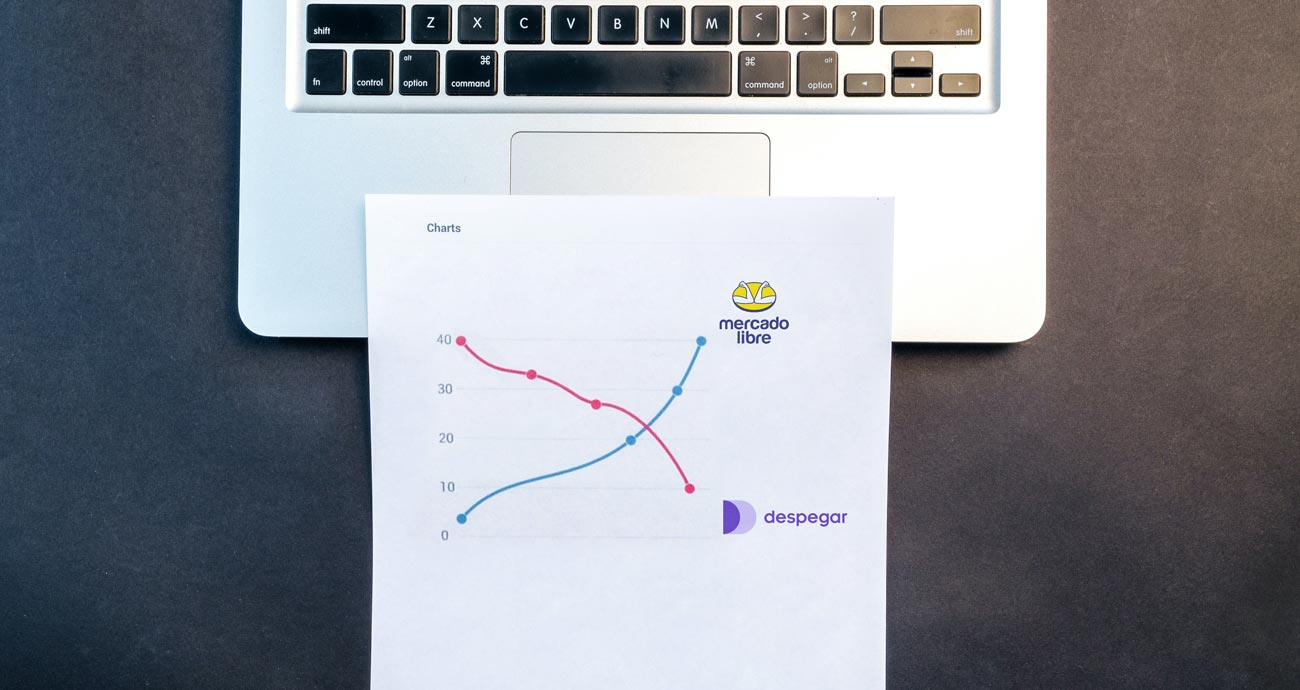Contxto – Like a classic romantic novel, Despegar and Mercado Libre seem to be destined to inversely correlated fates, at least for the time being. Travel is being hit mercilessly hard by global markets while e-commerce seems to be gaining traction even with previously unattended users.
Last week Mercado Libre and Despegar—both Argentine titans—released their numbers to the public investors. Results were divergent between the two, but there’s a clear negative correlation which is tumbling its Earnings Per Share (EPS) to a little over US$5, when it had reached US$15.44 within 52-week’s range.
Mercado Libre‘s shares (known as MELI) reported a 19.1 percent surge in stock price driven by positive first quarter (1Q) results. Meanwhile, Despegar registered a 33 percent hit in its revenue during the same period. Things are getting interesting indeed.
Despegar’s crash landing
Adjusted for EBITDA in 1Q2020 (that’s Earnings Before Interest, Taxes, Depreciation, and Amortization in the first three months of 2020), Despegar reported they had reached losses of US$15.6 million. This was compared to the US$15.2 million in the black that they had earned in 1Q2019.
Obviously, the extraordinary travel cancelations taking place by March severely affected the travel scaleup.
For this reason, the company is implementing a series of cost restructuring measures to soften the impact of the pandemic in its operations. Several strict measures, such as Argentina’s travel ban and lockdown, pushed the company to a hiring freeze.
They also applied pay cuts amounting to 50 percent for top executive salaries and 25 percent for middle management.
Additionally, Despegar reduced expenditures in tech and product development, as well as marketing and administrative tasks.
As Seeking Alpha—a financial publication—writes: “Despegar is an extremely high quality, fast-growing e-commerce business trading stock at over a 75 percent discount from its all-time highs.” It means that this could be a good time for a buy-low move… if the company manages to stay alive.
Now, Despegar’s CFO says the company has a strong cash reserve. Enough to withstand the upcoming turbulence, which he estimates, “will be sufficient to meet its currently anticipated cash needs for the next twelve months.”
“Our results during the quarter were impacted by the Covid-19 pandemic, which has severely disrupted travel worldwide. We entered this global health crisis with a strong balance sheet and healthy liquidity, closing 1Q2020 with a cash position of US$222 million, no long term financial liabilities and only a minimal amount of working capital short term debt.”
Statement by Despegar’s CEO
In line with plans to reduce cash outflows, the company is also planning to restructure its much anticipated acquisition of Best Day. Here’s what you need to know:
- The previously agreed terms were an approximately US$136 million acquisition price, with 65 percent payable upon closing, the remainder spread out over subsequent anniversaries.
- There may be a renegotiation of terms, especially in valuation and payments timing, but nothing has been confirmed yet.
- It still has to go through Mexico’s antitrust agency approval (COFECE).
Industry takeaways:
- The air travel industry has seen a 26 percent decrease in revenue over the past year, standing at US$36.9 million in 1Q2020 compared to US$49.7 million in 1Q2019.
- Packages, Hotels, and Travel Products saw a similar 53 percent decrease in 1Q2020 revenue, and a 35 percent year-over-year decrease on a per-transaction basis.
- There is still growth in terms of mobile transactions per user. Despite decrease in revenue, 44 percent of all transactions in 1Q2020 were done through mobile devices.
Mercado Libre’s run of the roost
Onto some good news. Mercado Libre is enjoying a free ride on investors’ and users’ optimism.
Not only are they not cutting back on expenditures, but they are moving forward with previous heavy expenditure plans, especially in Brazil, where they announced an investment of R$4 billion (~US$717 million) to launch a distribution center.
According to their 1Q2020 financial report, the company increased its user base by 30 percent, reaching 43.2 million across all of their markets.
Although revenue declined sharply but briefly during March—mostly driven by people cutting back on non-essential goods—, it still got back on its feet and reactivated sales during April, reaching 75 percent year-over-year growth.
Autoparts and consumer electronics are seeing a decline in growth rates, while healthcare, toys, and consumer packaged goods are growing rapidly.
Government-imposed restrictions on quarantine impacted Mercado Libre‘s business lines differently. This was mainly due to the wide variety of products across the marketplace. The one thing that did increase uniformly were logistic costs to handle the increased volume in demand.
“We might have to redirect some spending to logistics due to the rise in e-commerce demand, but for now the idea is to keep capital expenditure,” said Mercado Libre‘s vice president for Latin America, Stelleo Tolda.
Company Takeaways:
- Despite user, demand, and revenue growth, the company is still under stress. This 1Q2020 it cut losses by half compared to the last quarter, from US$68.9 million to US$29.7 million.
- Commerce revenue, measured year-over-year in US dollars, increased 32.7 percent while fintech revenue increased 45.2 percent. However, it grew by 83.4 percent on a foreign-exchange neutral basis.
- The e-commerce firm has hired 200 direct employees and 2,500 third-party contractors since the second half of March to strengthen its logistics team and cope with a higher volume of deliveries.
Industry takeaways:
- According to a recent PYMNTS survey, 52 percent of consumers that shifted to online grocery shopping, say they wouldn’t go back offline.
- Abandoned cart rates in online grocery shopping are up 8 percent. Could this be product scarcity and logistical complications causing users to have trouble finding what they need?
- High demand could surely backfire: In fact, Amazon admitted it’s having trouble keeping up with the increase. So, this will mean slower delivery times for “non-essential items”, and in some cases, not accepting these orders at all.
Related articles: Tech and startups from Argentina!
-VC







